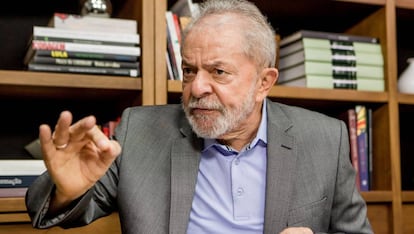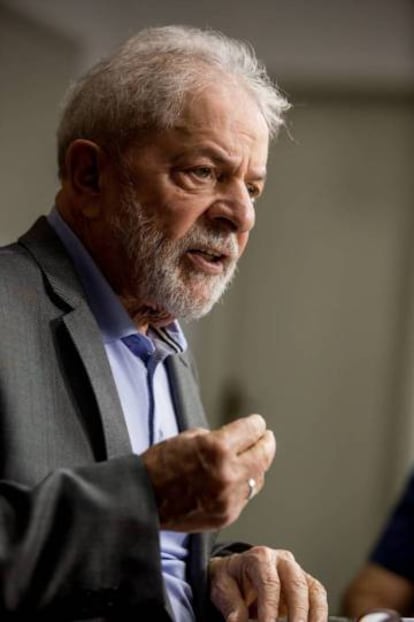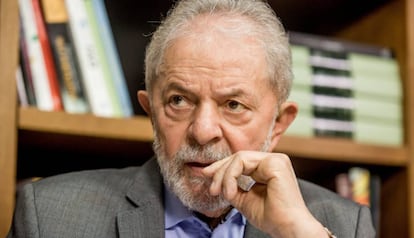Lula da Silva: “Bolsonaro’s government poses a great risk for Brazil”
The former Brazilian president talked to EL PAÍS about his future plans in one of the first interviews he has granted following his release by the Supreme Court


He has been saying for years that he would never retire from politics. And here he is at age 74, after having served two terms as president of Brazil, survived a cancer and spent 580 days in prison for corruption.
Luiz Inacio Lula da Silva talked to EL PAÍS about his future plans in one of the first interviews he has granted following his release by the Supreme Court. Twenty days after walking out of prison, while one of his appeals was undergoing review, he received this reporter at the headquarters of the Workers’ Party (PT) in São Paulo. Just hours later, a court upheld the conviction for money laundering and corruption, and raised the sentence from 12 to 17 years.
I am in Brazil, I am going to stay here and prove that they are liars
Question. What is it that has surprised you the most since you’ve been out of prison?
Answer. There hasn’t been much that was unexpected. What frightens me the most is seeing that the [Jair] Bolsonaro government is actually worse than the vision I had of it when I was behind bars. I think the way they are governing poses a great risk to Brazil.
Q. The government is worried that regional protests in Latin America could extend to Brazil. Against this backdrop, the economy minister on Monday evoked a security decree dating back to the 1964-1985 dictatorship. Do you feel that this government is a threat to democracy?
A. I think that within the government there are people who don’t fully understand what a democracy is. It is not a pact of silence. It is a society in motion that seeks to consolidate its social achievements and improve the lives of everyone in the country. He [Bolsonaro] does not appreciate democracy, nor do his children, nor does his party. He has repeatedly talked about shutting down the Supreme Court, Congress, restoring AI-5 [the decree that sparked the worst repression during the dictatorship]. They’ve already drafted who knows how many decrees to authorize arms [possession]. He thinks that everything can be fixed with armed people on the streets, when in truth, I believe that everything is solved with more technology, more education and more jobs. This is the second time that they have referenced [AI-5]; the first time, it was the president’s son. This is evidence that to them, democracy is not fundamental. For them, it gets in the way of governing. I feel that Brazil needs more democracy, more demonstrations, because that guarantees the consolidation of the institutions.

Q. There is a lot of unrest in Latin America. Why do you think there aren’t any protests in Brazil?
A. I think it’s because it’s been such a short time since Bolsonaro was elected president of the republic; it hasn’t been a full year yet. And during the first year, people expect good things to happen. But what’s happening now is greater unemployment, lower income and difficulties purchasing basic food items. The price of meat and cooking gas has really gone up, for instance. A lot of people are living on little money, yet the government is not talking about development policies...This creates dissatisfaction, and as this feeling builds up, there will certainly start to be demonstrations. The government needs to understand that this is all part of democracy.
Q. What is your strategy now?
A. The first thing is to keep up the political battle to prove my innocence. I need to prove that all the processes against me are falsehoods, lies, inventions by the media and the prosecution services and Judge Sergio Moro [who convicted Lula and who is now the justice minister]. The second thing is helping the Workers’ Party to get ready for the municipal elections of 2020 and the presidential run of 2022.
Q. Does that help include encouraging the left to go protest on the streets?
A. The role of a former president of the republic is not to agitate society against the winner of the election. One day, as I was chatting with [former Spanish PM Felipe] González and [former US president Bill] Clinton, they told me that it was not good politics to become entrenched in systematic opposition or to say: ‘Out with the president.’ My role now is to show society that only through lots of democracy, through lots of wealth distribution and job creation, can the conditions be created for this country to grow. But for the left, the streets are an obligation in any country in the world. I first got into politics by holding strikes in 1975, 78, 79, 80… I don’t know why the current government is afraid of seeing the people on the streets. He himself [Bolsonaro] supported mobilizations against [former president Dilma] Rousseff, against the PT. Demonstrating on the streets is proof that society is alive and that it won’t allow [Bolsonaro] to dismantle Brazil. That’s all.
They have always governed for one third of the people. We dare to govern for all
Q. When you became president, you were very successful as a conciliator. Why are you now choosing to be more combative?
A. When you want to govern a country, you need to take into account the fact that society is heterogeneous: there are rich people, poor people, middle-class people. And you need to govern for everyone, while prioritizing the neediest. I used to be in government, but now I need to do opposition work, showing the people the mistakes of the current government, which so far has failed to mention the word development. The only thing they are doing is dismantling our public heritage. If Brazil is not bankrupt, it’s because of the reserves that the Lula and Dilma administrations left behind.
Q. Moro is the most popular politician in Brazil, and you are one of the most hated. Do you trust that your two convictions will be overturned and your disqualification from office quashed?
A. First of all, Moro is the most deceitful judge in the country. He built his image on a deal with the Brazilian media. It is my moral duty to prove that the people who could contribute to fighting corruption are practically a gang within part of the judicial power, part of the prosecution services, who are using [the sweeping corruption case] Car Wash for eminently political goals.
Q. Right now, three judges are reviewing your appeal against your second conviction. Are you afraid of going back to prison?
A. I am not afraid. If there is something I’m not afraid of, it’s the [pending] cases.
Q. But it could happen.
A. Look, I could have fled the country, gone to an embassy to avoid becoming a prisoner. I decided to turn myself in to prove that both Judge Moro and [lead prosecutor Deltan] Dallagnol lied to the country about my conviction. I am convinced of my innocence. I am in Brazil, I am going to stay here and prove that they are liars.

Q. Do you trust the justice system?
A. I have to believe that justice will be done. That is why I am appealing to a higher court, because the lower one is corrupted.
Q. If you manage to get your convictions overturned, will you run for president again?
A. It’s not about wanting to run, I’m already 74 years old. And in 2022 I will be 77. It’s not recommendable. Yet I am in good health, and I am prepared. The only possibility would be if there was a political disaster, if there was no candidate, and somebody were needed to face up to these madmen who are governing Brazil.
Q. What most worries you about what this government has said and done?
A. The disregard for social issues. They are not concerned at all about the unemployed, the homeless, deforestation, the environment, with the oil that reaches the beaches in the northeast. The Brazilian people need books and jobs, but [Bolsonaro] wants to give them weapons. Brazil has no disputes with anybody, but he wants there to be disputes and to submit in the most embarrassing way possible to the Americans, which Brazil has never done. He believes that he is still a local resident in a Rio neighborhood under militia control.
Q. How do you think Bolsonaro will end his term?
A. I don’t know. I hope he ends up taking care of the Brazilian people.
Q. Part of Brazil’s wealth under the PT government came from the boom in raw materials, which is over.
The US does not like any Latin American country to be a political protagonist
A. That is only a half-truth. What we achieved was to distribute more fairly the result of Brazil’s growing economy. It was under us that for the first time the poorest 20% improved more than the richest 15%. It was during our governments that the people got to have their own homes, jobs, to travel by plane, to go to restaurants. [...] For us, there is only one way for Brazil to grow – to include all of society so that they take part in the economy. Here they have always governed for one third of the people. We dared to govern for all.
Q. Is inequality the greatest problem of our time?
A. Yes, it is not possible that there are billions of human beings that go to sleep every night hungry when humanity is producing more food than it can consume. It means these people need money to buy food. We see Trump speaking of protectionism when he should be speaking about helping to develop the poor world.
Q. Why do black and poor people in Brazil still suffer from so much inequality?
A. For the first time, thanks to our politics of social inclusion, black people and mestizos make up 51% of university students. That is a victory. And the data shows that it was our government that made it possible to have a second revolution to end slavery.
Q. But there is still a lot to be done…
A. There is a lot to be done around the world, not only in Brazil. Now I follow soccer in Spain, Italy and the United Kingdom, and every now and then I see horrible scene where black players are called “monkeys.”
Q. What is your solution for Latin America, given the unrest seen in Colombia, Chile and Bolivia?
A. Latin America needs to spend more time under democracy so that we can build solid institutions. A country will not go anywhere if there is a coup every 10 or 15 years. What happened in Bolivia should not be possible. Evo Morales became the longest-serving president of Bolivia, with the greatest growth in the region and the best income transfer… Why was there a coup? I believe the best model is in Brazil. You are president, you can be reelected once, full stop. You don’t need two [elections]. Alternation is important. I was the first worker to reach the presidency. And Evo Morales was the first indigenous person to become president in Bolivia. The elite here does not know how to live under a democracy if it is not in power, which is disgraceful.
Q. Brazil once rubbed shoulders with the big shots but its foundations turned out to be weak?
A. That is the main self-criticism of the Brazilian elite, which destroyed the Brazilian people’s dream of transforming themselves. We were the most optimistic people in the world. We got along with the socialists and conservatives of Spain, France, England, Germany. I got along with [former Republican US president George] Bush and with [former Democratic US president Barack] Obama, with the Chinese and with the Russians. Brazil is a builder of consensus, of peace. That was its role in Latin America. You couldn’t just think about growth, you had to think about growth that would include all the countries you share a border with. I had to be very careful with Latin America because the US does not like any Latin American country to be a political protagonist.
My role now is to show society that only through lots of democracy can the conditions be created for this country to grow
Q. Back then, Brazilian people were more open, minorities were winning greater rights. Now there has been a clear step backwards. Has this surprised you?
A. Yes, and this step backwards is in large part due to the media. Because for years, the media in Brazil have urged the people to reject politics. And when you reject politics, what comes is much worse. That’s how Nazism and fascism were born.
Q. Are you able to live with the fact that Bolsonaro is president?
A. I don’t need to like Bolsonaro to respect the institution of the presidency of the Republic. Nor does he need to like me to respect me as a human being. I don’t want to marry my political adversary, it’s enough for him to be civil. Political debate is another issue.
Q. Since your release, have you been to the park, a beach, some open space?
A. I have been taking care of myself for 30 years. I have not been to a restaurant or a bar for 30 years. The best security a politician can have is to not go anywhere where it would be easy for something to happen.
Q. When do you begin the tour of the country you announced?
A. I will rest a little in my freedom until Christmas. Then I have to go home. I am going to get married.
Q. When?
A. When I have time.
Q. Before Christmas?
A. There’s not enough time. I have to get myself ready.
Q. Can you confirm that singer Chico Buarque is going to be your best man?
A. Nothing has been confirmed but it would be an honor. There’s no date but there will be a wedding.
Q. Here in São Paulo?
A. I don’t know. I’ll invite you.
This is an edited version of the full interview published in Spanish on Thursday by EL PAÍS.
English version by Susana Urra and Melissa Kitson.
Tu suscripción se está usando en otro dispositivo
¿Quieres añadir otro usuario a tu suscripción?
Si continúas leyendo en este dispositivo, no se podrá leer en el otro.
FlechaTu suscripción se está usando en otro dispositivo y solo puedes acceder a EL PAÍS desde un dispositivo a la vez.
Si quieres compartir tu cuenta, cambia tu suscripción a la modalidad Premium, así podrás añadir otro usuario. Cada uno accederá con su propia cuenta de email, lo que os permitirá personalizar vuestra experiencia en EL PAÍS.
¿Tienes una suscripción de empresa? Accede aquí para contratar más cuentas.
En el caso de no saber quién está usando tu cuenta, te recomendamos cambiar tu contraseña aquí.
Si decides continuar compartiendo tu cuenta, este mensaje se mostrará en tu dispositivo y en el de la otra persona que está usando tu cuenta de forma indefinida, afectando a tu experiencia de lectura. Puedes consultar aquí los términos y condiciones de la suscripción digital.








































